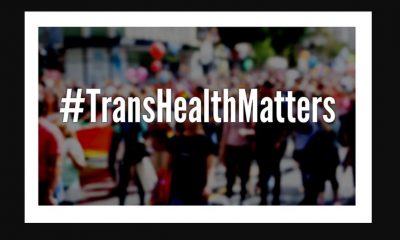National
Trans experiences with the internet range from ‘harrowing’ to ‘powerful’
New survey provides insights into the stakes of web use for LGBTQ adults

Alex, 29, would not have met their friends without the internet. While living in a small city surrounded by farmland, finding community was not always easy.
Alex tried out one of those apps for adults seeking to make friends. It turned out to be a remarkable success. “I’ve made my friend group as a direct result of using the internet,” they said, explaining that even though all the friends are trans, due to their diverse interests, “we would have been hard-pressed to have ever really run into each other by happenstance.”
Making friends online is also safer for Alex. Before they pursued HRT and surgery and looked more “visibly queer,” they were in scary situations. “I’ve had pickup trucks chase me while driving, people call out slurs while driving by me, and I’ve been shot at,” they said.
Having the internet available for appointments, work, and social activities is fundamental to their life.
But the web was not always such a friendly place for Alex. “There’s so much hate and falsehoods out there about trans people,” they said. “It’s why it takes so long for some of us to learn about who we are.”
This dissonance is widespread within the LGBTQ community. A recent report—”ctrl+alt+lgbt: Digital Access, Usage, and Experiences of the LGBTQ+ Community”—by LGBT Tech and Data for Progress provides insight into that phenomenon.
Shae Gardner, director of policy at LGBT Tech, explained that most of the research about the LGBTQ community’s internet use historically has focused on youth. The project aimed to fill the gap. From surveys with 1,300 people across the country, the report found that while the internet is a foundational space for LGBTQ community building and self-expression, it also comes with a high risk for bullying and harassment.
These findings intensify when looking specifically at the data for underrepresented groups within the LGBTQ population like the transgender community, who are by far the group that faces the most harassment online, per the Anti-Defamation League. Gardner explained that the survey was over-sampled for transgender individuals intentionally. “We really wanted to understand that specific experience,” Gardner said.
The Blade interviewed five trans people about their experiences to gain insight into how different community members felt while navigating the web and specifically identified sources who do not have public platforms and therefore do not face heightened public scrutiny. Due to concern for backlash, all sources for this story spoke on condition of anonymity with gender-ambiguous names and they/them pronouns.
Four out of five of the people interviewed emphasized that the internet is a vital resource for accessing healthcare.
Riley, 24, explained, “I have such immense dread about transitioning because I don’t want to have to interact with doctors around my identity. I feel like I don’t have access to providers who are able to understand me.”
The internet, for many, provides a safe location to access health information and care without the judgment of doctors. Kai, 23, and Cameron, 27, both shared that the internet was an important place for them to learn specifics around trans healthcare and seek out trans-friendly providers. Alex agreed and added that they have made it so all of their doctors’ appointments through tele-health.
These experiences are consistent with the larger trans community. LGBT Tech’s survey found that 70% of transgender adults use the internet to find LGBTQ-friendly healthcare. By comparison, only 41% of cisgender LGBTQ adults use the internet to find the same friendly care.
All the sources interviewed said they sought LGBTQ community online with varying degrees of success.
Jordan, 24, said that not only is social media a good way to stay connected with people they know, but it also helps them find a broader community. “It’s nice to follow other trans and queer people whose experiences can inspire me or make me feel seen.”
Cameron emphasized that the internet provides connections to activities and communities around town. “Social media has facilitated my in-person queer and trans community,” they explained. “I learn a lot about what queer events are happening around town via social media. I have a wonderful community playing queer sports that I wouldn’t have found without the internet.”
Kai shared that it hasn’t been a successful pursuit for them: “I wish it did more than it does.”
Per Trans Tech’s survey, transgender adults “often” use social media to connect with existing LGBTQ friends and family 41% of the time (as opposed to “sometimes” “rarely” or “never”). This is 21% more than the LGBTQ community at large. The survey also reveals that transgender adults are 20% more likely to “often” use social media to connect with new LGBTQ community than the LGBTQ community at large.
Everyone but Cameron has experienced some form of direct bullying or harassment for being transgender, either online or in person. The survey found that 83% of transgender adults have faced bullying online. By comparison, 59% of the cisgender LGBTQ community faced bullying online.
“Technology is only as good as its application. And this is the other side of the dual-edged sword,” said Gardner.
Gardner explained that the online and in-person harassment was mirrored. “The experiences of anti-LGBTQ bullying were very high, both for LGBTQ+ individuals and especially for trans individuals, but those numbers were nearly equitable to the experiences that that they have in the real world with anti-LGBTQ+ bullying,” she said. The survey found that 82% of transgender adults faced bullying in person.
The survey found despite the comparable levels of harassment and high levels of misinformation (93% of transgender adults saw anti-LGBTQ misinformation online), respondents overwhelmingly felt safe online—67% of trans adults and 76% of cisgender LGBTQ adults.
When she compared this phenomenon to her life, Gardner wasn’t surprised. “The harassment that I have faced online has certainly felt less immediately threatening than what I’ve faced in person. The mental toll it takes is significant, but I would argue individuals probably have an easier time getting away from it.”
That doesn’t stop Gardner from noting, “We need to be fighting [harassment] in both places.”
She explained that, “when we are staring down the barrel of record-setting anti-LGBTQ+ legislation yet again, it is so integral to keep fighting for digital spaces to be as safe as possible.”
Regardless of its safety, it is a space that is a constant for many. “I use the internet constantly,” said Alex. “I use the internet a lot at work since I have a desk job,” said Jordan.
When reflecting on the internet, Riley summed up the tensions they experience. “It can be harrowing often but simultaneously it’s where I feel a sense of community and access.”
(This story is part of the Digital Equity Local Voices Fellowship lab through News is Out. The lab initiative is made possible with support from Comcast NBCUniversal.)
New York
Pride flag removed from Stonewall Monument as Trump targets LGBTQ landmarks
The new NPS policy targets Pride flags amid consistent efforts from the Trump administration to minimize LGBTQ history

A rainbow Pride flag flying at the Stonewall National Monument in New York was removed at the direction of Trump administration officials at the National Park Service, according to a source familiar with the matter who spoke to the Blade on condition of anonymity.
The source said the move had been in the works for weeks and is part of ongoing efforts by the Trump-Vance administration to erase LGBTQ identity from federally controlled landmarks.
In response to the Blade’s request for information about the new flag policy, the National Park Service provided the following statement:
“Current Department of the Interior policy provides that the National Park Service may only fly the U.S. flag, Department of the Interior flags, and the Prisoner of War/Missing in Action flag on flagpoles and public display points. The policy allows limited exceptions, permitting non-agency flags when they serve an official purpose. These include historical context or reenactments, current military branch flags, flags of federally recognized tribal nations affiliated with a park, flags at sites co-managed with other federal, state, or municipal partners, flags required for international park designations, and flags displayed under agreements with U.S. Citizenship and Immigration Services for Naturalization ceremonies.”
The statement also included official guidance on the display of non-agency flags issued by Trump-appointed National Park Service Director Jessica Bowron.
The Blade reached out to other organizations to confirm the status of the Pride flag last week, including the Stonewall National Monument Visitor Center, the NYC Landmarks Preservation Commission, and the National Parks Conservation Association. None were able to provide details about whether the flag was still flying at that time but it has since been removed.
This action aligns with other moves targeting and erasing LGBTQ history. In September, the Blade reported that three organizations originally slated to receive more than $1.25 million from the National Park Service’s Underrepresented Communities Grant Program would no longer receive funding: In Washington, D.C., the Preservation League had been awarded $75,000 to document LGBTQ+ historic resources. In Providence, R.I., the Preservation Society was slated for $74,692 to conduct an LGBTQ+ survey and prepare a National Register nomination. And in New York, the Fund for the City of New York, Inc., had been awarded $32,000 to nominate the residence of Bayard Rustin — the iconic civil rights and LGBTQ activist — as a National Historic Landmark.
Florida
Disney’s Gay Days ‘has not been canceled’ despite political challenges
GayDays is moving forward with its planned LGBTQ meet-up

Gay Days in Orlando is preparing for its 2026 gathering though organizers have yet to release full details.
Concerns emerged about the status of the annual meetup of LGBTQ people at Walt Disney World in Orlando, Fla., after social media posts and multiple news outlets reported the event would not take place this year.
In response to inquiries from the Blade, Josh Duke, co-owner of Gay Days, clarified that an update would come this week.
“At this time, I’d like to clarify that Gay Days Orlando has not been canceled,” an email to the Blade said. “We are currently finalizing details regarding our plans for 2026 and will be making an official announcement later this week.”
Earlier this week, Gay Days posted about a pause in their plans for the annual meeting, which quickly gained traction online.
In an official statement on social media, Gay Days organizers cited several factors behind what had initially appeared to be a cancellation of their 2026 event.
“Changes to our host hotel agreement, the loss of key sponsorship support, and broader challenges currently impacting LGBTQIA+ events nationwide made it impossible to deliver the experience our community deserves,” organizers wrote. However, the statement added, “This is a pause — not an ending.”
In a longer message shared with supporters, organizers elaborated on that now-reversed decision.
“Gay Days Family — it is with very heavy hearts that we share Gay Days 2026 will not take place this year. This was an incredibly difficult decision and one that was only made after every possible option was explored.
“Gay Days has always been more than an event — it is community, family, and a place where so many memories are made. While this pause is painful, it also gives us the opportunity to step back, listen, and begin shaping a stronger and reimagined GayDays for the future. Thank you for your continued love, patience, and support. This is not goodbye — it’s a reset, and we look forward to creating the future of GayDays together.”
GayDays, which began in 1991, encourages queer Disney fans to visit the Orlando theme park while wearing red shirts to identify one another. Originally focused on gay men reclaiming the childhood joy often denied due to homophobia, the event has expanded over the years to include LGBTQ+ families on summer vacations and queer couples honeymooning in the Magic Kingdom.
Disney made history in 2019 by holding its first-ever official Pride event at its European park, Disneyland Paris. In 2023, Disneyland California hosted the first U.S. official Pride event.
Concerns about the potential cancellation had arisen amid broader challenges affecting LGBTQ events nationwide. These include changes in hotel agreements, sponsorship support, and Florida’s increasingly restrictive anti-LGBTQ policies under Gov. Ron DeSantis. Florida currently has an equality score of -3.00 out of 49 from the Movement Advancement Project, which evaluates states based on policies affecting relationship and parental recognition, nondiscrimination, religious exemptions, LGBTQ youth, healthcare, criminal justice, and transgender identity documentation.
Recent legislation in Florida has included prohibitions on hormone replacement therapy for transgender minors, restrictions on adult access to treatment, bans on drag performances for those under 18, bathroom bans for transgender people in state buildings, and expansion of the Parental Rights in Education Act, commonly called the “Don’t Say Gay” law. These measures limit public school instruction or discussion about sexual orientation and gender identity.
Gay Days Anaheim is scheduled to take place at Disneyland Resort in September.
Disney has also maintained a focus on Pride, reporting in 2022 that proceeds from Pride merchandise benefited numerous LGBTQ organizations, including GLSEN, PFLAG, The Trevor Project, Zebra Coalition, the Los Angeles LGBT Center, the LGBT Center Orange County, the San Francisco LGBT Center, and the Ali Forney Center. Pride merchandise sold internationally supports local LGBTQ organizations in those regions.
More details about this event are expected to be released on Friday.
Puerto Rico
Bad Bunny shares Super Bowl stage with Ricky Martin, Lady Gaga
Puerto Rican activist celebrates half time show

Bad Bunny on Sunday shared the stage with Ricky Martin and Lady Gaga at the Super Bowl halftime show in Santa Clara, Calif.
Martin came out as gay in 2010. Gaga, who headlined the 2017 Super Bowl halftime show, is bisexual. Bad Bunny has championed LGBTQ+ rights in his native Puerto Rico and elsewhere.
“Not only was a sophisticated political statement, but it was a celebration of who we are as Puerto Ricans,” Pedro Julio Serrano, president of the LGBTQ+ Federation of Puerto Rico, told the Washington Blade on Monday. “That includes us as LGBTQ+ people by including a ground-breaking superstar and legend, Ricky Martin singing an anti-colonial anthem and showcasing Young Miko, an up-and-coming star at La Casita. And, of course, having queer icon Lady Gaga sing salsa was the cherry on the top.”
La Casita is a house that Bad Bunny included in his residency in San Juan, the Puerto Rican capital, last year. He recreated it during the halftime show.
“His performance brought us together as Puerto Ricans, as Latin Americans, as Americans (from the Americas) and as human beings,” said Serrano. “He embraced his own words by showcasing, through his performance, that the ‘only thing more powerful than hate is love.’”
U.S. Supreme Court
Competing rallies draw hundreds to Supreme Court
Activists, politicians gather during oral arguments over trans youth participation in sports

Hundreds of supporters and opponents of trans rights gathered outside of the United States Supreme Court during oral arguments for Little v. Hecox and West Virginia v. B.P.J. on Tuesday. Two competing rallies were held next to each other, with politicians and opposing movement leaders at each.
“Trans rights are human rights!” proclaimed U.S. Sen. Ed Markey (D-Mass.) to the crowd of LGBTQ rights supporters. “I am here today because trans kids deserve more than to be debated on cable news. They deserve joy. They deserve support. They deserve to grow up knowing that their country has their back.”

“And I am here today because we have been down this hateful road before,” Markey continued. “We have seen time and time again what happens when the courts are asked to uphold discrimination. History eventually corrects those mistakes, but only after the real harm is done to human beings.”
View on Threads
U.S. Education Secretary Linda McMahon spoke at the other podium set up a few feet away surrounded by signs, “Two Sexes. One Truth.” and “Reality Matters. Biology Matters.”
“In just four years, the Biden administration reversed decades of progress,” said McMahon. “twisting the law to urge that sex is not defined by objective biological reality, but by subjective notion of gender identity. We’ve seen the consequences of the Biden administration’s advocacy of transgender agendas.”

U.S. Rep. Mark Takano (D-Calif.), chair of the Congressional Equality Caucus, was introduced on the opposing podium during McMahon’s remarks.
“This court, whose building that we stand before this morning, did something quite remarkable 6 years ago.” Takano said. “It did the humanely decent thing, and legally correct thing. In the Bostock decision, the Supreme Court said that trans employees exist. It said that trans employees matter. It said that Title VII of the Civil Rights Act protects employees from discrimination based on sex, and that discrimination based on sex includes discrimination based on gender identity and sexual orientation. It recognizes that trans people have workplace rights and that their livelihoods cannot be denied to them, because of who they are as trans people.”
“Today, we ask this court to be consistent,” Takano continued. “If trans employees exist, surely trans teenagers exist. If trans teenagers exist, surely trans children exist. If trans employees have a right not to be discriminated against in the workplace, trans kids have a right to a free and equal education in school.”
Takano then turned and pointed his finger toward McMahon.
“Did you hear that, Secretary McMahon?” Takano addressed McMahon. “Trans kids have a right to a free and equal education! Restore the Office of Civil Rights! Did you hear me Secretary McMahon? You will not speak louder or speak over me or over these people.”
Both politicians continued their remarks from opposing podiums.
“I end with a message to trans youth who need to know that there are adults who reject the political weaponization of hate and bigotry,” Takano said. “To you, I say: you matter. You are not alone. Discrimination has no place in our schools. It has no place in our laws, and it has no place in America.”
U.S. Supreme Court
Supreme Court hears arguments in two critical cases on trans sports bans
Justices considered whether laws unconstitutional under Title IX

The Supreme Court heard two cases today that could change how the Equal Protection Clause and Title IX are enforced.
The cases, Little v. Hecox and West Virginia v. B.P.J., ask the court to determine whether state laws blocking transgender girls from participating on girls’ teams at publicly funded schools violates the 14th Amendment’s Equal Protection Clause and Title IX. Once decided, the rulings could reshape how laws addressing sex discrimination are interpreted nationwide.
Chief Justice John Roberts raised questions about whether Bostock v. Clayton County — the landmark case holding that Title VII of the Civil Rights Act of 1964 protects employees from discrimination based on sexual orientation or gender identity — applies in the context of athletics. He questioned whether transgender girls should be considered girls under the law, noting that they were assigned male at birth.
“I think the basic focus of the discussion up until now, which is, as I see it anyway, whether or not we should view your position as a challenge to the distinction between boys and girls on the basis of sex or whether or not you are perfectly comfortable with the distinction between boys and girls, you just want an exception to the biological definition of girls.”
“How we approach the situation of looking at it not as boys versus girls but whether or not there should be an exception with respect to the definition of girls,” Roberts added, suggesting the implications could extend beyond athletics. “That would — if we adopted that, that would have to apply across the board and not simply to the area of athletics.”
Justice Clarence Thomas echoed Roberts’ concerns, questioning how sex-based classifications function under Title IX and what would happen if Idaho’s ban were struck down.
“Does a — the justification for a classification as you have in Title IX, male/female sports, let’s take, for example, an individual male who is not a good athlete, say, a lousy tennis player, and does not make the women’s — and wants to try out for the women’s tennis team, and he said there is no way I’m better than the women’s tennis players. How is that different from what you’re being required to do here?”
Justice Samuel Alito addressed what many in the courtroom seemed reluctant to state directly: the legal definition of sex.
“Under Title IX, what does the term ‘sex’ mean?” Alito asked Principal Deputy Solicitor General Hashim Mooppan, who was arguing in support of Idaho’s law. Mooppan maintained that sex should be defined at birth.
“We think it’s properly interpreted pursuant to its ordinary traditional definition of biological sex and think probably given the time it was enacted, reproductive biology is probably the best way of understanding that,” Mooppan said.
Justice Sonia Sotomayor pushed back, questioning how that definition did not amount to sex discrimination against Lindsay Hecox under Idaho law. If Hecox’s sex is legally defined as male, Sotomayor argued, the exclusion still creates discrimination.
“It’s still an exception,” Sotomayor said. “It’s a subclass of people who are covered by the law and others are not.”
Justice Elena Kagan highlighted the broader implications of the cases, asking whether a ruling for the states would impose a single definition of sex on the 23 states that currently have different laws and standards. The parties acknowledged that scientific research does not yet offer a clear consensus on sex.
“I think the one thing we definitely want to have is complete findings. So that’s why we really were urging to have a full record developed before there were a final judgment of scientific uncertainty,” said Kathleen Harnett, Hecox’s legal representative. “Maybe on a later record, that would come out differently — but I don’t think that — ”

“Just play it out a little bit, if there were scientific uncertainty,” Kagan responded.
Justice Brett Kavanaugh focused on the impact such policies could have on cisgender girls, arguing that allowing transgender girls to compete could undermine Title IX’s original purpose.
“For the individual girl who does not make the team or doesn’t get on the stand for the medal or doesn’t make all league, there’s a — there’s a harm there,” Kavanaugh said. “I think we can’t sweep that aside.”
Justice Amy Coney Barrett questioned whether Idaho’s law discriminated based on transgender status or sex.
“Since trans boys can play on boys’ teams, how would we say this discriminates on the basis of transgender status when its effect really only runs towards trans girls and not trans boys?”
Harnett responded, “I think that might be relevant to a, for example, animus point, right, that we’re not a complete exclusion of transgender people. There was an exclusion of transgender women.”
Justice Ketanji Brown Jackson challenged the notion that explicitly excluding transgender people was not discrimination.
“I guess I’m struggling to understand how you can say that this law doesn’t discriminate on the basis of transgender status. The law expressly aims to ensure that transgender women can’t play on women’s sports teams… it treats transgender women different than — than cis-women, doesn’t it?”
Idaho Solicitor General Alan Hurst urged the court to uphold his state’s ban, arguing that allowing participation based on gender identity — regardless of medical intervention — would deny opportunities to girls protected under federal law.
Hurst emphasized that biological “sex is what matters in sports,” not gender identity, citing scientific evidence that people assigned male at birth are predisposed to athletic advantages.
Joshua Block, representing B.P.J., was asked whether a ruling in their favor would redefine sex under federal law.
“I don’t think the purpose of Title IX is to have an accurate definition of sex,” Block said. “I think the purpose is to make sure sex isn’t being used to deny opportunities.”
Becky Pepper-Jackson, identified as plaintiff B.P.J., the 15-year-old also spoke out.
“I play for my school for the same reason other kids on my track team do — to make friends, have fun, and challenge myself through practice and teamwork,” said Pepper-Jackson. “And all I’ve ever wanted was the same opportunities as my peers. But in 2021, politicians in my state passed a law banning me — the only transgender student athlete in the entire state — from playing as who I really am. This is unfair to me and every transgender kid who just wants the freedom to be themselves.”

Outside the court, advocates echoed those concerns as the justices deliberated.
“Becky simply wants to be with her teammates on the track and field team, to experience the camaraderie and many documented benefits of participating in team sports,” said Sasha Buchert, counsel and Nonbinary & Transgender Rights Project director at Lambda Legal. “It has been amply proven that participating in team sports equips youth with a myriad of skills — in leadership, teamwork, confidence, and health. On the other hand, denying a student the ability to participate is not only discriminatory but harmful to a student’s self-esteem, sending a message that they are not good enough and deserve to be excluded. That is the argument we made today and that we hope resonated with the justices of the Supreme Court.”
“This case is about the ability of transgender youth like Becky to participate in our schools and communities,” said Joshua Block, senior counsel for the ACLU’s LGBTQ & HIV Project. “School athletics are fundamentally educational programs, but West Virginia’s law completely excluded Becky from her school’s entire athletic program even when there is no connection to alleged concerns about fairness or safety. As the lower court recognized, forcing Becky to either give up sports or play on the boys’ team — in contradiction of who she is at school, at home, and across her life — is really no choice at all. We are glad to stand with her and her family to defend her rights, and the rights of every young person, to be included as a member of their school community, at the Supreme Court.”
The Supreme Court is expected to issue rulings in both cases by the end of June.
Minnesota
Reports say woman killed by ICE was part of LGBTQ community
Renee Nicole Good shot in Minneapolis on Wednesday

A U.S. Immigration and Customs Enforcement agent shot and killed a woman in Minneapolis as she attempted to drive away from law enforcement during a protest on Wednesday.
The Star Tribune newspaper identified the victim as Renee Nicole Good, 37, a Minneapolis resident who lived blocks from where she was shot in the Central neighborhood, according to reports. Donna Ganger, Good’s mother, told the Star Tribune that her daughter lived in the Twin Cities with her wife.
Multiple videos of the shooting have gone viral on social media, showing various angles of the fatal incident — including footage that shows Good getting into her car and attempting to drive away from law enforcement officers, who had their weapons drawn.
In the videos, ICE agents can be heard telling Good to “get out of the fucking car” as they attempted to arrest her. Good, who press reports say was married to a woman, ended up crashing her car into an electric pole and other vehicles. She was later transported from the scene of the shooting and died at the hospital.
President Donald Trump defended the ICE agent on Truth Social, saying the officer was “viciously” run over — a claim that coincides with Homeland Security Secretary Kristi Noem’s assessment of the situation. Noem, a South Dakota Republican, insisted the officer “fired defensive shots” at Good after she attempted to run over law enforcement agents “in an attempt to kill them — an act of domestic terrorism.”
Multiple state and local officials disputed claims that the shooting was carried out in self-defense at the same time Noem was making those assertions.
An Instagram account that appears to belong to Good describes her as a “poet and writer and wife and mom and shitty guitar strummer from Colorado; experiencing Minneapolis, MN,” accompanied by a rainbow flag emoji.
A video posted to X after the shooting shows a woman, reportedly her wife, sitting on the ground, crying and saying, “They killed my wife. I don’t know what to do.”
“We’ve dreaded this moment since the early stages of this ICE presence in Minneapolis,” Mayor Jacob Frey said during a Wednesday press conference. “Having seen the video myself, I want to tell everybody directly that [the DHS’s claim of self-defense] is bullshit. This was an agent recklessly using power that resulted in somebody dying, getting killed.”
“I have a message for ICE. To ICE, get the fuck out of Minneapolis,” Frey continued. “We do not want you here. Your stated reason for being in this city is to create some kind of safety, and you are doing exactly the opposite. People are being hurt. Families are being ripped apart. Long-term Minneapolis residents that have contributed so greatly to our city, to our culture, to our economy are being terrorized, and now somebody is dead. That’s on you, and it’s also on you to leave.”
Across the Capitol, members of the House and the Senate condemned the actions of the officer.
“There’s no indication she’s a protester, there’s nothing that at least you can see on the video, and therefore nothing that the officers on the ground could see that identify her as someone who’s set out to try to do harm to an ICE officer,” U.S. Sen. Elizabeth Warren (D-Mass.) said Wednesday night on MS NOW’s “The Weeknight.”
“There is no evidence that has been presented to justify this killing,” House Minority Leader Hakeem Jeffries (D-N.Y.) said in a statement on his website. “The masked ICE agent who pulled the trigger should be criminally investigated to the full extent of the law for acting with depraved indifference to human life.”
“ICE just killed someone in Minneapolis,” U.S. Rep. Robert Garcia (D-Calif.) the highest-ranking Democrat on the House Oversight Committee, posted on X. “This administration’s violence against communities across our country is horrific and dangerous. Oversight Democrats are demanding answers on what happened today. We need an investigation immediately.”
In a statement to the Advocate, Human Rights Campaign President Kelley Robinson wrote, “Today, a woman was senselessly killed in Minneapolis during an ICE action — a brutal reminder that this agency and the Trump regime put every community at risk, spreading fear instead of safety. Reports that she may have been part of the LGBTQ+ community underscore how often the most vulnerable pay the highest price.”
National LGBTQ Task Force President Kierra Johnson also responded to Good’s death.
“We recognize and mourn the loss of Renee Nicole Good and extend our condolences to her family, loved ones, and community,” said Johnson in a statement. “This loss of life was preventable and reprehensible, particularly coming at the hands of federal agents.”
National
Top 10 LGBTQ national news stories of 2025
Trump, Supreme Court mount cruel attacks against trans community

President Trump’s anti-LGBTQ agenda dominated national news in 2025, particularly his cruel attacks on trans Americans. Here are our picks for the top 10 LGBTQ news stories the Blade covered in 2025.
10. Trump grants clemency to George Santos

President Donald Trump granted clemency to disgraced former Long Island Rep. George Santos. Santos was sentenced to 87 months in federal prison after pleading guilty to wire fraud and aggravated identity theft and had served just 84 days of his more than seven-year sentence. He lied to both the DOJ and the House Ethics Committee, including about his work and education history, and committed campaign finance fraud.
9. U.S. Olympics bans trans women athletes
The United States Supreme Court decided in 2025 to take up two cases — Little v. Hecox and West Virginia v. B.P.J.— both of which concern the rights of transgender athletes to participate on sports teams. The cases challenge state laws under the Equal Protection Clause of the 14th Amendment, which prevents states from offering separate boys’ and girls’ sports teams based on biological sex determined at birth. Both cases are set to be heard in January 2026. The developments follow a decision by the United States Olympic & Paralympic Committee to change eligibility rules to prohibit transgender women from competing in women’s sporting events on behalf of the United States, following Trump’s Executive Order 14201, “Keeping Men Out of Women’s Sports.”
8. FDA approves new twice-yearly HIV prevention drug
The U.S. Food and Drug Administration on June 18 approved a newly developed HIV/AIDS prevention drug that needs to be taken only twice a year, with one injection every six months. The new drug, lenacapavir, is being sold under the brand name Yeztugo by pharmaceutical company Gilead Sciences. According to trial data, 99.9 percent of participants who received Yeztugo remained HIV negative. This emerging technology comes amid direct cuts to HIV/AIDS research measures by the Trump–Vance administration, particularly targeting international HIV efforts such as PEPFAR.
7. LGBTQ people ‘erased’ from gov’t reports
Politico reported in March that the Trump–Vance administration is slashing the State Department’s annual human rights report, cutting sections related to the rights of women, people with disabilities, the LGBTQ+ community, and more. Members of Congress objected to the removal of the subsection on “Acts of Violence, Criminalization, and Other Abuses Based on Sexual Orientation, Gender Identity or Expression, or Sex Characteristics (SOGIESC)” from the State Department’s Annual Country Reports on Human Rights Practices.
In a Sept. 9 letter to Secretary of State Marco Rubio, U.S. Reps. Robert Garcia (D-Calif.), Julie Johnson (D-Texas), and Sarah McBride (D-Del.) urged the department to restore the information or ensure it is integrated throughout each report, noting that the reports serve as key evidence for asylum seekers, attorneys, judges, and advocates assessing human rights conditions and protection claims worldwide.
6. Trump admin redefines ‘sex’ in all HHS programs

The Trump administration canceled more than $800 million in research into the health of sexual and gender minority groups. More than half of the National Institutes of Health grants scrapped through early May involved studies of cancers and viruses that disproportionately affect LGBTQ people.
The administration is also pushing to end gender-affirming care for transgender youth, according to a new proposal from the Department of Health and Human Services, NPR reported. The administration is considering blocking all Medicaid and Medicare funding for services at hospitals that provide pediatric gender-affirming care. “These rules would be a significant escalation in the Trump administration’s attack on access to transgender health care,” said Katie Keith, director of the Center for Health Policy and Law at Georgetown University.
5. FBI plans to label trans people as ‘violent extremists’
The Human Rights Campaign, Transgender Law Center, Equality Federation, GLAAD, PFLAG, and the Southern Poverty Law Center condemned reports that the FBI, in coordination with the Heritage Foundation, may be working to designate transgender people as “violent extremists.” The concerns followed a report earlier this month by independent journalist Ken Klippenstein, who cited two anonymous national security officials saying the FBI is considering treating transgender subjects as a subset of a new threat category.
That classification—originally created under the Biden administration as “Anti-Authority and Anti-Government Violent Extremists” (AGAAVE) — was first applied to Jan. 6 rioters and other right-wing extremists. Advocates said the proposal appears to stem from the false claim that the assassination of Charlie Kirk was committed by a transgender person.
4. Pentagon targets LGBTQ service members

Acting in agreement with the growing anti-LGBTQ sentiment from the Trump administration, during a televised speech to U.S. military leaders at Marine Corps Base Quantico in late September, Defense Secretary Pete Hegseth denounced past military leadership for being too “woke,” citing DEI initiatives and LGBTQ inclusion within the Department of Defense. During the 45-minute address, Hegseth criticized inclusive policies and announced forthcoming directives, saying they would ensure combat requirements “return to the highest male standard only.”
Since 2016, a Navy replenishment oiler had borne the name of gay rights icon Harvey Milk, who served in the Navy during the Korean War and was separated from service under other than honorable conditions due to his sexuality before later becoming one of the first openly LGBTQ candidates elected to public office. In June 2025, the ship was renamed USNS Oscar V. Peterson.
The U.S. Air Force also announced that transgender service members who have served between 15 and 18 years would be denied early retirement and instead separated from the military without benefits. Transgender troops will be given the option of accepting a lump-sum payout offered to junior service members or being removed from service.
In February, the Pentagon said it would draft and submit procedures to identify transgender service members and begin discharging them from the military within 30 days.
3. Trump blames Democrats, trans people for gov’t shutdown
Republicans failed to reach an agreement with Democrats and blamed them for the government shutdown, while Democrats pointed to Republicans for cutting health care tax credits, a move they said would result in millions of people paying significantly higher monthly insurance premiums next year. In the White House press briefing room, a video of Democrats discussing past government shutdowns played on a loop as the president continued to blame the Democratic Party and “woke” issues, including transgender people.
“A lot of good can come from shutdowns. We can get rid of a lot of things. They’d be Democrat things,” Trump said the night before the shutdown. “They want open borders. Men playing in women’s sports. They want transgender for everybody.”
2. Supreme Court joins attacks on LGBTQ Americans

The U.S. Supreme Court issued multiple rulings this year affecting LGBTQ people. In Mahmoud v. Taylor (6–3), it ruled that public schools must give parents advance notice and the option to opt children out of lessons on gender or sexuality that conflict with their religious beliefs. The case arose after Montgomery County, Md., schools added LGBTQ-inclusive storybooks to the elementary curriculum.
In June, the court upheld Tennessee’s ban on gender-affirming care for transgender minors, protecting similar laws in more than 20 states. Lawmakers and advocates criticized the ruling, and a coalition of seven medical associations warned it strips families of the right to direct their own health care.
The Court also allowed the Trump administration to enforce a ban on transgender military personnel and to implement a policy blocking passports with “X” gender markers, with the federal government recognizing only male and female designations.
1. Trump inaugurated for second time
President Donald Trump became the 47th president after winning Wisconsin, securing 277 of the 270 electoral votes needed. His guidebook, Project 2025, outlined the Republican Party’s goals under his new leadership, with a particular focus on opposing transgender rights.
Trump nominated openly gay hedge fund executive Scott Bessent as U.S. Treasury Secretary, a role he eventually assumed. Bessent became the highest-ranking openly gay U.S. government official in American history.

Honorable mention: The war on rainbow crosswalks escalates around the country
Florida Gov. Ron DeSantis (R) ordered state transportation officials to remove a rainbow-colored crosswalk in Orlando next to the Pulse gay nightclub, where 49 mostly LGBTQ people were killed in a 2016 mass shooting. The move follows a July 1, 2025, announcement by U.S. Transportation Secretary Sean Duffy that, with support from President Trump, the department adopted a “nationwide roadway safety initiative” that political observers say could be used to require cities and states to remove rainbow street crosswalks.
Crime & Justice
San Fernando Valley LGBTQ+ community center Somos Familia Valle is trying to rebuild from a “traumatizing” break-in
This Monday, burglars stole $8,000 worth of essential materials from the organization.

In the early hours of Monday morning, burglars broke through three walls of the Sun Valley LGBTQ+ community center Somos Familia Valle. They rummaged through two main rooms and left with $8,000 worth of technology: 15 Chromebooks, two iPads, a camera, two microphones, and a large audio system that staff members used to host programs like Queer Yoga and Vogue Classes. “I was scared because I was wondering if it was a hate thing,” said Somos Familia Valle co-founder and president Kevin Al Perez.
Perez had woken that day with his usual routine of checking the building’s cameras and Wi-Fi systems remotely. Suddenly, he jolted after noticing they’d been turned off for hours. Since he was away, he asked his father to check on the space. “Everything’s fine,” his father replied, who said that the main door looked untouched.
After stepping inside, the damage became clear. Pieces of walls were torn out and strewn across the floor, items were hastily tossed aside, and the technology normally utilized for the center’s phone banking program, fitness classes, and community workshops were missing. “This is our first space,” Perez told the Blade, noting how devastating this break-in has been, both physically and mentally, for himself and his community members.
Somos Familia Valle began as a grassroots movement in 2014, when Perez and other LGBTQ+ locals noticed the absence of a Pride parade in the San Fernando Valley. Together, they organized a vibrant, joyous celebration of queer identity, planting the roots of what is now an intersectional space that uplifts and pours into the Valley’s diverse residents. For nearly a decade, they hosted programs at other community spaces, such as the Sherman Oaks East Valley Adult Center, before moving into their brick-and-mortar location on Sheldon Street.
With this physical space, Perez and Somos Familia Valle’s community organizer, Damiana Cano, have evolved that core mission with new branches. It is important for them to not only prioritize queer education and empowerment but also voter engagement mobilization, know your rights workshops, computer literacy classes, and physical health programs to fuel the safety and strength of people who seek support from the center.
“As someone who was born and raised in this community, I think it is so fulfilling and beautiful that LGBTQ people of all generations have a safe space to come together and create beautiful art here in the Northeast SFV,” Cano wrote to the Blade. “Over time, this…became more than a community; these people are my family.”
In response to the break-in, the community has stepped up. Perez opened a GoFundMe campaign, and within three days, it has surpassed its initial $8,000 goal. Right after the break-in, the center halted all programming. Now, with this wave of support, Perez says that these offerings, which include a TGI support group, mental health task force, Pride committee, and Queer Country will likely resume in January.
Somos Familia Valle will also move forward with their upcoming “Queer Together” holiday party, which will be held at their center on Sheldon Street. Perez told the Blade that the walls have been repaired, and he is determined to honor the resilience of the center and the people it serves. “It’s heartbreaking and traumatizing [but] they’re not going to take that away from us,” Perez said.
The break-in is currently under investigation by local law enforcement agents. To support Somos Familia Valle, their GoFundMe campaign is linked here.
Kristie Song is a California Local News Fellow placed with the Los Angeles Blade. The California Local News Fellowship is a state-funded initiative to support and strengthen local news reporting. Learn more about it at fellowships.journalism.berkeley.edu/cafellows.
National
As house Democrats release Epstein photos, Garcia continues to demand DOJ transparency
Blade this week sat down with gay House Oversight Committee ranking member

Democrats on the House Oversight Committee have released new photos from Jeffrey Epstein’s email and computer records, including images highlighting the relationship between President Donald Trump and the convicted sex offender.
Epstein, a wealthy financier, was found guilty of procuring a child for prostitution and sex trafficking, serving a 13-month prison sentence in 2008. At the time of his death in prison under mysterious circumstances, he was facing charges of sex trafficking and conspiracy to traffic minors.
Among those pictured in Epstein’s digital files are Trump, former President Bill Clinton, former Trump adviser Steve Bannon, actor and director Woody Allen, economist Larry Summers, lawyer Alan Dershowitz, entrepreneurs Richard Branson and Bill Gates, and Andrew Mountbatten-Windsor.
One photo shows Trump alongside Epstein and a woman at a Victoria’s Secret party in New York in 1997. American media outlets have published the image, while Getty Images identified the woman as model Ingrid Seynhaeve.
Oversight Committee Democrats are reviewing the full set of photos and plan to release additional images to the public in the coming days and weeks, emphasizing their commitment to protecting survivors’ identities.
With just a week left for the Justice Department to publish all files related to Epstein following the passage of the Epstein Files Transparency Act, which requires the Justice Department to release most records connected to Epstein investigations, the Washington Blade sat down with U.S. Rep. Robert Garcia (D-Calif.), the ranking member on the Oversight Committee to discuss the current push the release of more documents.
Garcia highlighted the committee’s commitment to transparency and accountability.

“We’ve said anything that we get we’re going to put out. We don’t care who is in the files … if you’ve harmed women and girls, then we’ve got to hold you accountable.”
He noted ongoing questions surrounding Trump’s relationship with Epstein, given their long history and the apparent break in friendship once Trump assumed public office.
“There’s been a lot of questions about … Donald Trump and Jeffrey Epstein. They were best friends for 10 years … met women there and girls.”
Prior to Trump’s presidency, it was widely reported that the two were friends who visited each other’s properties regularly. Additional reporting shows they socialized frequently throughout the 1990s and early 2000s, attending parties at Trump’s Mar-a-Lago resort in Florida and Epstein’s residences. Flight logs from an associate’s trial indicate Trump flew on Epstein’s private jet multiple times, and Epstein claimed Trump first had sex with his future wife, Melania Knauss, aboard the jet.
“We’ve provided evidence … [that leads to] questions about what the relationship was like between Donald Trump and Jeffrey Epstein.”
Garcia stressed the need for answers regarding the White House’s role in withholding information, questioning the sudden change in attitude toward releasing the files given Trump’s campaign promises.
“Why is the White House trying to cover this up? So if he’s not covering for himself … he’s covering up for his rich friends,” Garcia said. “Why the cover up? Who are you hiding for? I think that’s the question.”
He confirmed that Trump is definitively in the Epstein files, though the extent remains unknown, but will be uncovered soon.
“We know that Trump’s in them. Yeah, he’s been told. We know that Trump’s in them in some way. As far as the extent of it … we don’t know.”
Garcia emphasized accountability for all powerful figures implicated, regardless of financial status, political party, or personal connections.
“All these powerful men that are walking around right now … after abusing, in some cases, 14‑ and 15‑year‑old girls, they have to be held accountable,” he said. “There has to be justice for those survivors and the American public deserves the truth about who was involved in that.”
He added that while he is the ranking member, he will ensure the oversight committee will use all available political tools, including subpoenas — potentially even for the president.
“We want to subpoena anyone that we can … everyone’s kind of on the table.”
He also emphasized accountability for all powerful figures implicated, regardless of financial status, political party, or relationship with the president.
“For me, they’re about justice and doing the right thing,” Garcia said. “This is about women who … were girls and children when they were being abused, trafficked, in some cases, raped. And these women deserve justice.”
“The survivors are strong.”
Deputy White House Press Secretary Abigail Jackson issued a statement regarding the release the photos, echoing previous comments from Republicans on the timing and framing of the photos by the Oversight Committee.
“Once again, House Democrats are selectively releasing cherry-picked photos with random redactions to try and create a false narrative,” Jackson said.
“The Democrat hoax against President Trump has been repeatedly debunked and the Trump administration has done more for Epstein’s victims than Democrats ever have by repeatedly calling for transparency, releasing thousands of pages of documents, and calling for further investigations into Epstein’s Democrat friends,”
In a press release on Friday, Garcia called for immediate DOJ action:
“It is time to end this White House cover-up and bring justice to the survivors of Jeffrey Epstein and his powerful friends. These disturbing photos raise even more questions about Epstein and his relationships with some of the most powerful men in the world. We will not rest until the American people get the truth. The Department of Justice must release all the files, NOW.”





(Photo courtesy of the U.S. House Oversight Committee)
National
White House deadnames highest-ranking transgender official
Rachel Levine’s portrait altered at HHS

Admiral Rachel Levine — the first transgender person ever confirmed by the U.S. Senate and the highest-ranking trans official in American history — had her official portrait in the Humphrey Building altered, with staff replacing her correct name with her deadname, the name she has not used since 2011.
NPR first reported the change, and an HHS spokesperson confirmed to the outlet that Levine’s portrait had recently been altered. A digital photograph obtained by NPR shows Levine’s former (male) name typed on a placard beneath the portrait, placed under the glass of the frame.
Levine served as a four-star admiral in the U.S. Public Health Service Commissioned Corps under the Biden-Harris administration and was appointed the 17th assistant secretary for health.
During her tenure, Levine oversaw the Commissioned Corps and helped lead national public-health initiatives, including the federal COVID-19 response and vaccination strategy; efforts to address rising syphilis infection rates; HIV/AIDS prevention and treatment programs; and strategies to combat the opioid epidemic, particularly through expanded harm-reduction approaches for the communities most affected.
The Trump-Vance administration’s decision to publicly deadname Levine is widely viewed within the trans community as demeaning and disrespectful. The move comes amid a series of federal policy reversals targeting LGBTQ Americans, particularly trans youth seeking gender-affirming care.
Those actions include: weakening workplace protections for LGBTQ employees; limiting restroom access; downgrading gender-identity discrimination cases; pressuring hospitals to end gender-affirming care; cutting HIV research and prevention funding; removing LGBTQ crisis resources; restricting access to trans-inclusive medical policies for veterans and young people; supporting trans sports bans and threatening funding for teams that include trans athletes; and forcing schools and universities to eliminate DEI and LGBTQ offices, inclusive curricula, gender-neutral bathrooms, and books or training materials addressing LGBTQ issues.
The Trump–Vance administration has also expanded federal censorship by removing LGBTQ language from surveys, agency websites, Smithsonian materials, and human-rights reports; blocking Pride recognitions; creating federal communications that misgender trans women; imposing passport and travel barriers for trans Americans; lifting protections for trans service members; limiting benefits and care for LGBTQ veterans; and pressuring states, universities, and hospitals to end trans-inclusive policies under threat of losing federal research, education, or Medicaid funds. The administration has additionally deported LGBTQ asylum seekers to unsafe conditions, removed LGBTQ issues from global human-rights reporting, and escalated anti-trans rhetoric at public events.
These actions stand in stark contrast to Levine’s public-health record. As assistant secretary for health, she worked to expand LGBTQ+ health data collection, promote equitable vaccine distribution, strengthen national health-equity initiatives, and reduce care disparities experienced by historically underserved communities, including LGBTQ populations. Within HHS, she led councils and task forces dedicated to reducing structural barriers to care and improving community outcomes.
Before joining the federal government, Levine oversaw health and safety for nearly 13 million residents as Pennsylvania’s physician general from 2015–2017 and as Pennsylvania secretary of health from 2018–2021.

Asked by NPR about the alteration of her official portrait, Levine responded that it had been an honor to serve as assistant secretary for health, adding: “I’m not going to comment on this type of petty action.”
-

 Bars & Parties1 day ago
Bars & Parties1 day agoSoCal queer singles come together as we celebrate LA’s Top Eligible LGBTQ Singles at the Abbey this Thursday!
-

 Los Angeles3 days ago
Los Angeles3 days agoProject Angel Food is now able to feed 10,000 people daily with expanded building
-

 Sports4 days ago
Sports4 days agoMichael Ferrera is paving a path of safety and liberation for queer athletes
-

 Arts & Entertainment4 days ago
Arts & Entertainment4 days ago2026 Best of LGBTQ LA Readers’ Choice Award Nominations
-

 AIDS and HIV3 days ago
AIDS and HIV3 days agoCongresswoman Maxine Waters introduces new resolution for National Black HIV/AIDS Awareness Day
-

 Sports4 days ago
Sports4 days agoBlade, Pride House LA announce 2028 Olympics partnership
-

 Books2 days ago
Books2 days agoNew book explores homosexuality in ancient cultures
-

 Commentary2 days ago
Commentary2 days agoAre we done with ‘Drag Race?’
-

 Features1 day ago
Features1 day agoFrom the Desk of AJSOCAL: How the QTAPI community celebrates Lunar New Year
-

 Puerto Rico1 day ago
Puerto Rico1 day agoBad Bunny shares Super Bowl stage with Ricky Martin, Lady Gaga











